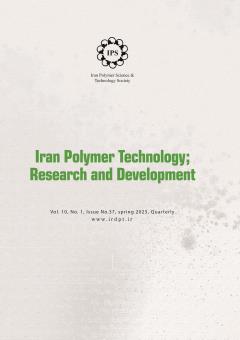Application of artificial intelligence technology in the development of polymers
Subject Areas :Mohsen Nazarian 1 * , Sattar Hasanpoor 2
1 - polymer engineering,Department of Polymer Engineering,Amirkabir University of Technology (Tehran Polytechnic),Tehran, Irann
2 - polymer engineering,Department of Polymer Engineering,Amirkabir University of Technology (Tehran Polytechnic),Tehran, Irann
Keywords: Polymer development, artificial intelligence, machine learning, polymer recycling, green polymers,
Abstract :
This article explores the role of artificial intelligence (AI) in polymer science, emphasizing its impact on design, manufacturing, quality control, and sustainability. Advanced AI algorithms are revolutionizing polymer development by enabling precise modeling and simulation, optimizing material properties, and enhancing manufacturability. Machine learning techniques are being applied in process simulation, real-time monitoring, and predictive maintenance, leading to fewer defects, reduced waste, and improved operational efficiency. The article also examines AI's contributions to recycling and waste management, showcasing innovative solutions for creating durable and recyclable polymers that align with circular economy principles. Additionally, AI supports the development of biobased and biodegradable polymers, offering eco-friendly alternatives for applications such as packaging and medical devices. The research underscores the importance of interdisciplinary collaboration to fully leverage AI's potential, demonstrating how these technologies can drive greener production, reduce resource consumption, and promote environmental sustainability. By integrating AI into polymer science, this paper highlights its transformative role in advancing sustainable materials and processes, positioning AI as a cornerstone in the evolution of the field. The findings suggest that AI not only accelerates innovation but also addresses critical environmental challenges, making it an indispensable tool for the future of polymer science and sustainable industrial practices.
1. Tran, H., Gurnani, R., Kim, C., Pilania, G., Kwon, H.K., Lively, R.P. and Ramprasad, R., Design of functional and sustainable polymers assisted by artificial intelligence, Nature Reviews Materials, pp.1-21,2024
2. Lase, I.S., Tonini, D., Caro, D., Albizzati, P.F., Cristóbal, J., Roosen, M., Kusenberg, M., Ragaert, K., Van Geem, K.M., Dewulf, J. and De Meester, S., How much can chemical recycling contribute to plastic waste recycling in Europe? An assessment using material flow analysis modeling, Resources, Conservation and Recycling, 192, p.106916, 2023
3. Yakoubi, S., Sustainable Revolution: AI-Driven Enhancements for Composite Polymer Processing and Optimization in Intelligent Food Packaging, Food and Bioprocess Technology, pp.1-26, 2024
4. Badini, S., Regondi, S. and Pugliese, R., Unleashing the power of artificial intelligence in materials design, Materials, 16(17), p.5927, 2023
5. Zarei, A. and Farazin, A., Machine learning insights into the influence of Carbon Nanotube dimensions on Nanocomposite properties: A Comprehensive Exploration, Journal of Computational Applied Mechanics, 55(3), pp.462-472, 2024
6. Estaji, S., Akbari, H., Tayouri, M.I., Miri, F.S., Salahshoori, I., Ruckdaschel, H., Dawi, E.A. and Khonakdar, H.A., Development of microstructure-rheological and electrical properties relationship in PS/POE/HNTs blend nanocomposites using machine learning, Polymer Testing, p.108503, 2024
7. Gaspar-Cunha, A., Covas, J.A. and Sikora, J., Optimization of Polymer Processing: A Review (Part I—Extrusion), Materials, 15(1), p.384, 2022
8. Panesar, A., Carollo, V. and Jamal, M., Simulation-Driven Design and the Role of Optimization in Design for Additive Manufacturing, 2023
9. Edeleva, M., De Smit, K., Debrie, S., Verberckmoes, A., Marien, Y.W. and D'hooge, D.R., Molecular scale-driven upgrading of extrusion technology for sustainable polymer processing and recycling, Current Opinion in Green and Sustainable Chemistry, 43, p.100848, 2023
10. Dananjaya, S.A.V., Chevali, V.S., Dear, J.P., Potluri, P. and Abeykoon, C., 3D printing of biodegradable polymers and their composites–Current state-of-the-art, properties, applications, and machine learning for potential future applications, Progress in Materials Science, p.101336, 2024
11. Sani, A.R., Zolfagharian, A. and Kouzani, A.Z., Artificial intelligence‐augmented additive manufacturing: insights on closed‐loop 3D printing, Advanced Intelligent Systems, 6(10), p.2400102, 2024. 12. Mahmood, M.A., Visan, A.I., Ristoscu, C. and Mihailescu, I.N., Artificial neural network algorithms for 3D printing, Materials, 14(1), p.163, 2020
13. Srivastava, S., Varshney, B., Sharma, V.P. and Ali, B., Applications of Artificial Intelligence in Polymer Manufacturing, Application of Artificial Intelligence in New Materials Discovery, 147, pp.105-122, 2023
14. Jo, C.M., Jang, W.K., Seo, Y.H. and Kim, B.H., In Situ Surface Defect Detection in Polymer Tube Extrusion: AI-Based Real-Time Monitoring Approach, Sensors, 24(6), p.1791, 2024
15. Dananjaya, S.A.V., Chevali, V.S., Dear, J.P., Potluri, P. and Abeykoon, C., 3D printing of biodegradable polymers and their composites–Current state-of-the-art, properties, applications, and machine learning for potential future applications, Progress in Materials Science, p.101336, 2024
16. Lubongo, C., Bin Daej, M.A. and Alexandridis, P., Recent developments in technology for sorting plastic for recycling: The emergence of artificial intelligence and the rise of the robots, Recycling, 9(4), p.59, 2024
17. Lodhi, S.K., Gill, A.Y. and Hussain, H.K., Green innovations: Artificial intelligence and sustainable materials in production, BULLET: Jurnal Multidisiplin Ilmu, 3(4), pp.492-507, 2024
18. Atasi, C., Kern, J. and Ramprasad, R., Design of Recyclable Plastics with Machine Learning and Genetic Algorithm, Journal of Chemical Information and Modeling, 64(24), pp.9249-9259, 2024
19. Atasi, C., J. Kern, and R. Ramprasad, Design of Recyclable Plastics with Machine Learning and Genetic Algorithm. Journal of Chemical Information and Modeling, 2024

